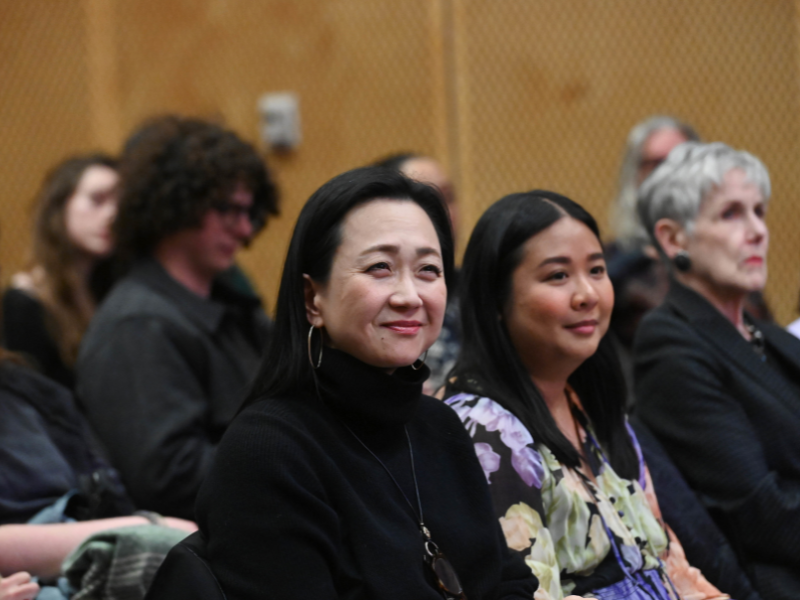
Min Jin Lee & E.M.Tran sit together in the audience before interview
2023 Zale-Kimmerling Writer-in-Residence: Min Jin Lee By Laura Wolford
The 2023 Zale-Kimmerling Writer-in-Residence Program featured the brilliant and candid Min Jin Lee as its featured author.
Lee is the author of the novels Free Food for Millionaires (2007) and Pachinko (2017). Free Food for Millionaires was named one of the Top 10 Novels of the Year by The New York Times, a notable novel by the San Francisco Chronicle, a New York Times Editor’s Choice, and was a selection for the Wall Street Journal’s Juggle Book Club. Pachinko was a finalist for the National Book Award, and runner-up for the Dayton Literary Peace Prize. It also served as the focal point of Lee’s on-campus visit.
Lee has received fellowships from the Guggenheim Foundation, the Radcliffe Institute of Advanced Study at Harvard University, and the New York Foundation for the Arts. She is an inductee of the New York Foundation for the Arts Hall of Fame and the New York State Writers Hall of Fame. Currently, Lee serves as Writer-in-Residence at Amherst College and serves as a trustee of PEN America and a director of the Authors Guild. She is also working on her third novel, American Hagwon, as well as a nonfiction work, Name Recognition. Newcomb organized a series of events for this year’s Writer-in-Residence program, all highlighting Lee’s engaging and charismatic personality. The events included a public reading and interview with E.M. Tran, author of Daughters of the New Year (2022). Lee was introduced at the public reading by Tulane senior Karen Huang, who also had the opportunity to dine with both Lee and Tran.
“[Lee] is a beautiful woman, who is unapologetically curious about the world and dedicated to her craft. It was very refreshing and inspiring to meet her,” reflected Huang. “I [also] enjoyed meeting E.M. Tran, who is also a child of immigrants from Vietnam, and speaking to her about her experiences as a new author. I am endlessly grateful to Newcomb Institute for the opportunity to partake in this event.”
Lee stayed long after the reading to introduce herself, take photos, and sign books for those in attendance. In the days that followed, she visited classes across the university, spending time with students in Tulane’s Asian Studies and History departments, and the Newcomb Scholars Program. Her class visit with Professor Jana Lipman’s course on immigration history in the United States included a particularly meaningful conversation about Lee’s work and history. Lee also attended two very meaningful small group events: a dinner with members of the Asian Studies faculty, and a book group conversation with students, organized by the Newcomb Institute.
Lee’s ability to connect with each person she interacted with is unmatched, and her time on campus was a reminder of the ways in which literature can bring us together and foster big conversations.
